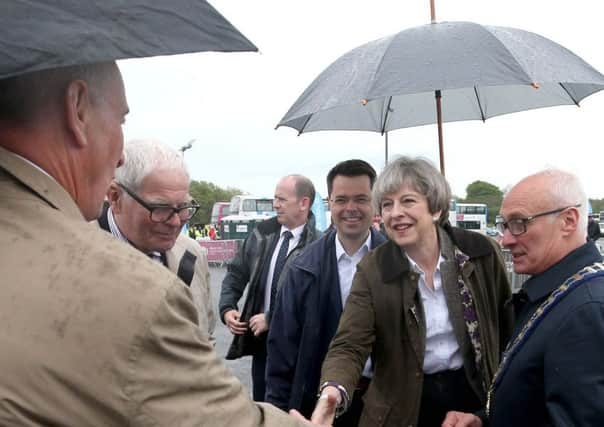Election is taking place amid global turbulence, as even PM is finding


A decade ago there was little hint of the turbulence that is now buffeting the West: a financial crisis that brought the banking system to its knees, followed by a bitter recession. Then came the electoral turmoil.
Scotland went from being a sure bet to stay in the UK to, suddenly, a close run thing.
Advertisement
Hide AdAdvertisement
Hide AdThen the Conservatives scored a surprise 2015 overall majority, and thrust the country on the path to an In-Out EU referendum that David Cameron never thought he would have to hold because he didn’t expect to be holding power without a constraining coalition partner.


The Brexit vote last year was famously lost by the then prime minister.
Meanwhile Jeremy Corbyn was nominated by Labour MPs to appear on their leadership ballot to provide variety – not because anyone thought he would win, which he did (and fending off a challenge a year later).
Just when it seemed that electoral gravity could be defied no more, Donald Trump first proved wrong those who said he could not win the Republican Party nomination, and then those who said he could not win the presidency.
Advertisement
Hide AdAdvertisement
Hide AdHe won both and is still breaking every political rule in the book.


Meanwhile the future of the western alliance is under a cloud, Russia is rampant, Syria remains in chaos, Greece is still battling currency trauma, the EU is grappling with mass immigration, France and Austria and the Netherlands have flirted with far right leaders, and countries from the Republic of Ireland to Belgium to Italy to Australia have struggled to sustain stable governments.
To many observers it seemed, perhaps, that Theresa May had emerged as a rare contemporary figure of sobriety, authority and stability.
Her surprise announcement on Easter Tuesday of a snap election was, on one level, no real surprise: the prime minister was so far ahead in the opinion polls that from a Conservative Party perspective it must have seemed almost reckless not to call an election.
Advertisement
Hide AdAdvertisement
Hide AdThe by-election result in Copeland, when the Tories actually took the seat off the opposition, was the first such result in a by-election since 1982.
No wonder then that Mrs May was tempted to ignore the uproar over her breaking her word, and chose to go to the country.
A huge overall majority and a five-year government mandate would clearly make Brexit negotiations easier.
At first it seemed that the election would be a walkover for the Tories and the ruin of the Labour Party.
But always expect the unexpected in elections.
Mrs May’s public appearances have often seemed uncertain.
Advertisement
Hide AdAdvertisement
Hide AdMr Corbyn, liberated by low expectations, has seemed increasingly assured.
And he keeps drawing large enthusiastic crowds.
In the last fortnight opinion polls have begun to show much narrower Conservative leads over Labour, of as little as 5%.
Then yesterday’s edition of The Times included YouGov predictions that Mrs May would fall short of an overall majority.
There is every possibility, perhaps a probability, that this a rogue poll, that it is an ‘outlier’. In any bundle of polls there will be some findings that fall outside of the norm.
Advertisement
Hide AdAdvertisement
Hide AdBut coming after of the other findings it suggests that Mrs May’s campaign is not resonating in the way that most commentators assumed it would.
Jeremy Corbyn, like Bernie Sanders in the United States and other traditional left wing politicians in other countries, has tapped into widespread anger at injustices such as the lavish public bailing out of reckless bankers.
The liklihood remains that Mrs May will not only win, she will increase her overall majority.
Pollsters say that many voters make up their minds months, if not years, before an election. If that is so, it would seem that too many British people decided that Mr Corbyn was too radical to be prime minister, and reached that conclusion too long ago to change it.
Advertisement
Hide AdAdvertisement
Hide AdBut this recent flurry of polls means that no-one will now be astonished if Mrs May has a much more modest win than was first anticipated.
If somehow she does fail to get an overall majority, it is hard to see her staying in office. Someone of her traditional values will almost certainly feel that she has to resign immediately if she loses an election that she did not need to call.
A narrow shortfall will of course put the DUP in a strong position at Westminster, and might also tempt Sinn Fein to end its abstentionist policy and enjoy some clout at Westminster.
But the leadership of the country will be plunged into fresh uncertainty.
Advertisement
Hide AdAdvertisement
Hide AdIt is hard to see any obvious contender in the Conservative Party to be prime minister.
And, if it loses a majority, the party will only be filling that post if it can get another party to share power with it.
This scenario of the Tories losing their majority still seems unlikely, however.